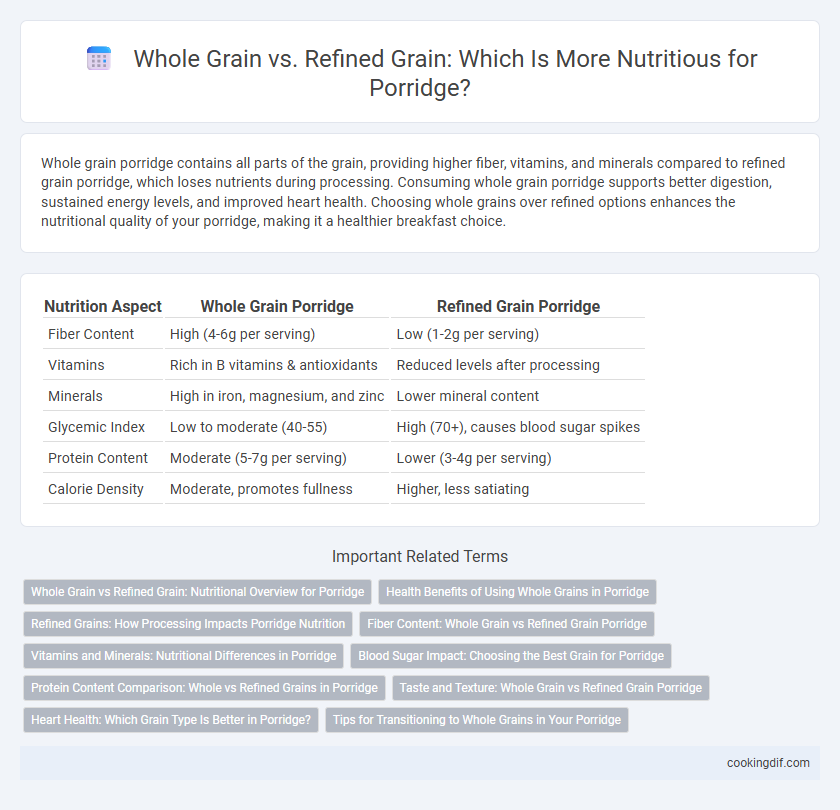Whole grain porridge contains all parts of the grain, providing higher fiber, vitamins, and minerals compared to refined grain porridge, which loses nutrients during processing. Consuming whole grain porridge supports better digestion, sustained energy levels, and improved heart health. Choosing whole grains over refined options enhances the nutritional quality of your porridge, making it a healthier breakfast choice.
Table of Comparison
| Nutrition Aspect | Whole Grain Porridge | Refined Grain Porridge |
|---|---|---|
| Fiber Content | High (4-6g per serving) | Low (1-2g per serving) |
| Vitamins | Rich in B vitamins & antioxidants | Reduced levels after processing |
| Minerals | High in iron, magnesium, and zinc | Lower mineral content |
| Glycemic Index | Low to moderate (40-55) | High (70+), causes blood sugar spikes |
| Protein Content | Moderate (5-7g per serving) | Lower (3-4g per serving) |
| Calorie Density | Moderate, promotes fullness | Higher, less satiating |
Whole Grain vs Refined Grain: Nutritional Overview for Porridge
Whole grain porridge contains all parts of the grain kernel, including the bran, germ, and endosperm, providing higher fiber, vitamins, and minerals compared to refined grain porridge that only includes the endosperm. The increased fiber content in whole grain porridge supports better digestion and prolonged satiety, while refined grains tend to digest quickly, causing rapid blood sugar spikes. Whole grain options for porridge deliver essential nutrients such as B vitamins, iron, magnesium, and antioxidants, which are often lost during the refining process.
Health Benefits of Using Whole Grains in Porridge
Whole grain porridge retains bran, germ, and endosperm, providing higher fiber, essential nutrients, and antioxidants compared to refined grain versions. Increased dietary fiber from whole grains supports digestive health, regulates blood sugar levels, and promotes sustained energy release. Consuming whole grain porridge is linked to reduced risk of cardiovascular disease, type 2 diabetes, and improved weight management.
Refined Grains: How Processing Impacts Porridge Nutrition
Refined grains undergo milling that removes the bran and germ, significantly reducing fiber, vitamins, and minerals in porridge. This processing results in a smoother texture but lowers the nutritional benefits compared to whole grains, leading to higher glycemic index and faster digestion. Consequently, porridge made from refined grains offers less satiety and fewer essential nutrients than whole grain alternatives.
Fiber Content: Whole Grain vs Refined Grain Porridge
Whole grain porridge offers significantly higher fiber content compared to refined grain porridge, promoting better digestive health and prolonged satiety. The bran and germ in whole grains retain essential nutrients and dietary fiber, which are largely removed during the refining process. Consuming whole grain porridge supports stable blood sugar levels and enhances gut health due to its rich soluble and insoluble fiber components.
Vitamins and Minerals: Nutritional Differences in Porridge
Whole grain porridge contains higher levels of vitamins and minerals, including B vitamins, iron, magnesium, and zinc, compared to refined grain porridge, which loses much of these nutrients during processing. The bran and germ in whole grains preserve essential micronutrients that support energy metabolism and immune function. Consuming whole grain porridge enhances nutrient density and promotes better overall health than porridge made from refined grains.
Blood Sugar Impact: Choosing the Best Grain for Porridge
Whole grain porridge contains higher fiber content that slows glucose absorption, resulting in a more gradual blood sugar rise compared to refined grain porridge. The low glycemic index of whole grains helps maintain stable insulin levels, reducing the risk of blood sugar spikes and promoting sustained energy. Refined grains, stripped of bran and germ, can cause rapid glucose surges, making them less ideal for blood sugar management in porridge recipes.
Protein Content Comparison: Whole vs Refined Grains in Porridge
Whole grain porridge contains significantly higher protein levels than refined grain varieties, offering approximately 7-9 grams of protein per cooked cup compared to 3-4 grams in refined options. The presence of the bran and germ in whole grains contributes to a richer amino acid profile essential for muscle repair and sustained energy. Choosing whole grain porridge supports better satiety and nutritional balance due to its enhanced protein content and fiber.
Taste and Texture: Whole Grain vs Refined Grain Porridge
Whole grain porridge offers a nutty flavor and a coarser, chewier texture due to intact bran and germ, enhancing both taste complexity and nutritional benefits. Refined grain porridge provides a smoother, creamier consistency with a mild taste, making it easier to digest but lower in fiber and essential nutrients. Choosing whole grains boosts dietary fiber and antioxidants, while refined grains deliver a softer mouthfeel favored by those seeking a lighter porridge experience.
Heart Health: Which Grain Type Is Better in Porridge?
Whole grain porridge contains higher fiber content and essential nutrients like magnesium and antioxidants, which support cardiovascular health by reducing cholesterol levels and improving blood pressure. Refined grain porridge lacks these beneficial components due to processing that removes bran and germ, leading to a higher glycemic index and less heart-protective effects. Consuming whole grain porridge regularly contributes to better heart health outcomes compared to refined grain options.
Tips for Transitioning to Whole Grains in Your Porridge
Choosing whole grains for your porridge significantly boosts fiber intake, essential vitamins, and minerals compared to refined grains, which lose much of their nutritional value during processing. To ease the transition, gradually mix increasing proportions of whole grains with refined ones while experimenting with flavors and textures, such as adding cinnamon or nuts to enhance taste. Consistent consumption of whole grain porridge supports digestive health, stabilizes blood sugar levels, and promotes sustained energy throughout the day.
Whole grain vs refined grain for porridge nutrition Infographic

 cookingdif.com
cookingdif.com